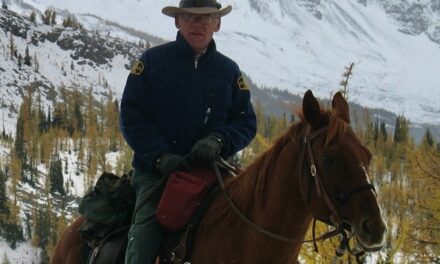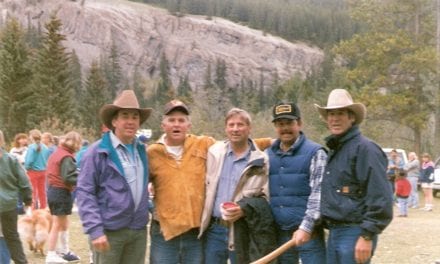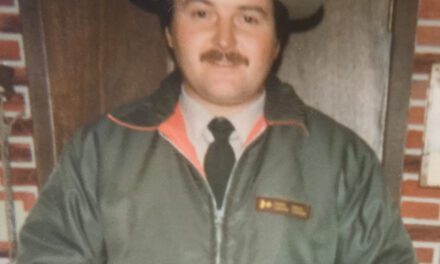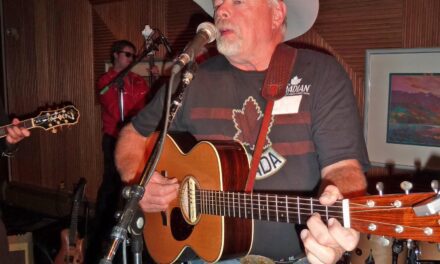Thank you to the Whyte Museum of the Canadian Rockies for granting permission to the Park Warden Service Alumni to post this interview on our website.
Park Warden Alumni Society of Alberta Oral History Project Summer 2019
This Oral History interview was funded in part by a research grant received in 2019 from the Government of Alberta through the Alberta Historical Resources Foundation.
In Person Interview with Gerry Israelson, August 12, 2019 – 2:00 pm, Invermere, BC
Interviewed by Susan Hairsine
Place and date of birth? Gerry was born July 30, 1955 in Carrot River, Saskatchewan
(Tape August 12 – 3:19 pm – 7 min 53 seconds)
SH: Where did you grow up?
Gerry: I grew up in the lower mainland of British Columbia; a Surrey boy. I stayed there through high school and moved to Calgary and spent some time there. At the ripe old age of, I’m going to say 20, (I) went to Selkirk College, post-secondary, in Castlegar, British Columbia.
SH: What did you study there?
Gerry: I studied in a forestry program called Wildland Recreation.
SH: How did you become involved in the Warden Service?
Gerry: I was fortunate enough to be offered a summer job by BC Parks. Ironically it was out of Wasa Lake, and involved hanging out in a wilderness park for a couple of months. It was called Hamber Park which encompasses Fortress Lake which is on Jasper Park’s west boundary. I spent essentially a couple of months in the bush with a biologist, assisting in a variety of ways.
SH: How did you get on with National Parks?
Gerry: Well I guess they (BC Parks) liked my work and I guess I fit in the outfit in their organization, and so for the next three summers I was offered additional work within the BC Parks program in the Kootenays. So I spent some time in Assiniboine Park, Bugaboo Glacier and spent some time in Elk Lakes Park. In my last season with BC Parks I was asked to join a park planning project. And so, got to travel with my supervisor throughout essentially the eastern coal block of British Columbia which was actually pretty cool, looking at potential recreation sites and poking around into a variety of other outdoor recreational facilities that were operated by BC Parks. And one of those places we ended up going and taking a look at, and proposing for inclusion into the BC Parks system, was the Lake of the Hanging Glacier. They didn’t listen to us. Laughs..
So that tweaked my interest in Parks and I likely could have stayed in the BC Parks system. But my supervisor at that point in time recommended that I look at the National Parks system. BC Parks at that time was not in a hiring process and the National Parks was in a period of growth and the opportunity for full time jobs was far greater within that organization than if I had chosen to stay.
SH: So I get this straight, the work with BC Parks was summer seasonal?
Gerry: Yes, summer seasonal while I was in college.
SH: So you applied for work within the National Parks and then what?
Gerry: Well I applied with the National Parks, and at that time my brother Clair was also working within Parks Canada and had been working in Waterton – he can tell his own story. I had the opportunity to visit there. And then he’d been transferred to Yoho Park and into Lake Louise, actually into Banff shortly thereafter, so I knew what the national parks system was in terms of work. So, then I applied, and there was this fellow called Jim Sime who was working out of the regional office in Calgary and in charge of recruitment visited the college. Prior to his arrival he set up an interview period and interviewed a number of other people. One guy that I had the pleasure of working with in National Parks was Al McDonald. We were in the same program and we both we both got interviews and were both successful in that process and we ended up spending our first summer together working in the national parks system in Elk Island National Park, just east of Edmonton in year one.
SH: What made you want to join the Warden Service?
Gerry: The work. I knew that the work involved a high percentage of outdoor operational tasks that I found attractive. I appreciated the mountain landscape and that was my goal, and of course, based on my visits with my brother, I had in depth insight into some of the physical challenges, mental challenges, the variety of the tasks that were available that were an option for me as well, should I find my way into the Park Warden Service.
SH: What different parks did you work in? And the second part of that is how did they compare. Do you have a favorite?
Gerry: The parks I was assigned to in the first two-thirds of my career in order were, Elk Island, Yoho, (both of those were summer seasonal postings), Lake Louise which was part of Banff Park, and still is, and that posting was initially winter seasonal, so I was fortunate enough in 1978 to be offered a transfer to Yoho in the summer. And then that same fall there were winter seasonal positions, available working in avalanche control at both Sunshine and Lake Louise. I competed on those jobs and landed one in Lake Louise and so it was back and forth for a couple of seasons, between Yoho in the summer and Lake Louise in the winter. Then full time work came up for competition, essentially entering my third winter in Lake Louise – I think it was 1980 that I ended up landing a full time job and was posted in Lake Louise. In 1983 I transferred to Jasper and moved on to another job that involved the LLYK (Lake Louise, Yoho, Kootenay) field unit, with my base out of Radium and that move was made in 1998 until my retirement in early 2011.
SH: How did they compare? Do you have a favorite?
Gerry: I think one of the interesting parts of my job in both the mountain rescue/public safety function and then later on in the backcountry specialist position, was that I was afforded the opportunity as part of my work to travel across Canada and to do a little north and south as well, and provide leadership and training in mountain rescue. So I got to go to Newfoundland, Nova Scotia; I got to go to Kluane Park; I got into Ontario, in the Bruce Peninsula area. No need for me in Manitoba or Saskatchewan. But in my role at the end of my career in the Backcountry Specialist position, it involved travel essentially in the old mountain block, essentially I went as far east as Waterton and as far west as Mount Revelstoke Park and I provided some observations to Park Superintendents in respect to operational consistency in terms of land use policy etc. So, in terms of what park was my favorite – I don’t know, I don’t have a favorite – the mountain place and the mountain spaces. I don’t have a favorite park. There all beautiful places.
SH: Okay, we are kind of skipping around but what were some of your main responsibilities (over the years? (Tape 06:40)
Gerry: When I first got into Parks Canada the focus at that point in time was that wardens were generalists. So for example, in a place like Elk Island Park in the summer there were maybe 8 wardens or something like that, that staffed that park. So the team of wardens were essentially responsible for everything from enforcement issues in the campgrounds, appropriate visitor conduct, problem wildlife issues, recreational considerations in respect to trails and trail clearing. And so it was a generalist role and so that was Elk Island, my ten months there. One of the interesting tasks that I’ll never forget in that park was our involvement with buffalo and sort of the routine handling and management of those big creatures and of course that was all new to me. And the requirements as part of that job to develop some horsemanship skills which was also completely new to me as well. And so those old grizzled veterans – Fred Dickson comes to mind; he was the leader in the park at that point in time, an excellent horseman, an excellent mountain man. He ran dogs when he was working out of Jasper and horses in the summer. He had his family out in the bush, so he’d done it all. So I consider myself lucky to have learned from one of the best in terms of horsemanship and in terms of attitude towards the job. An old fellow called Bill Walburger, came from Jasper, he was a big fellow, a husky boy… Bill Walburger, a big man who could be really intimidating. But incredibly good with people, particularly when there was the potential for problems and difficulties with campers and parties, and noise. He was fabulous, able to just defuse any potential issues. So it was a real eye opener for me.
SH: Those guys were both in Elk Island? (09 52)
Gerry: Yes, both in Elk Island.
And then Yoho, same thing. In the summer of 1978, a very generalist role and lots of ex-military guys came out of the Korean War and WW2 as well, and so one of the core skills between Parks was their ability to travel and work on horses. A common-sense approach to issues and difficulties. Just to feel comfortable in travel in the backcountry, travel in a wilderness setting, and generally they were just really good with people. Soft enforcement, would be the soft approach to handling issues involving the public. At that point in time there was no law enforcement section. I believe it was called public relations or something like that. I don’t think it t was called enforcement. So that was Yoho.
And then moving onto Lake Louise, and of course in all the parks, there was this trend, there was this requirement for education, and the veterans that were there… you’ve probably heard this before, there was no educational requirement, it was their ability to do the job in the field. And so some of the guys had high school, some of the guys had a little bit of post-secondary, but that was extremely unusual. But it was basically if you could handle the tasks that were asked of you in a wilderness setting, odds were you got the job. (Tape 12 42)
The 1980s there was a move towards a more specialized approach. And one of the areas that was expanding rapidly was the mountain rescue/public safety function. The hippy years, the 60s through the 70s, saw exponential growth in hiking and Nordic skiing, and anything outdoors, canoeing. Getting back to the land smoking weed, all that stuff. Laughs…. So that side of things, and there’s a whole history to the mountain rescue/public safety function that I won’t get into, but they were looking for wardens that had the interest and the physical potential to function competently within the mountains. So the philosophy was that wardens … well Parks Canada has the responsibility to manage resources and people on the land. And the land of course would refer to national parks, and so to do that competently required skills and training. And so the Warden Service training program came into being in the 1960s with (Walter) Perren and then Alpine Specialists Peter (Fuhrmann) and Willi (Pfisterer), and those were the folks that were charged with developing the skill sets that the organization would need to manage the anticipated demands in respect to safety in the mountain parks.
SH: So there you are ….
Gerry: Yes, so there I am. So I had affinity for that. I’d been doing that for awhile. I’d been climbing before I came into the outfit. I’d been skiing a little bit before I came into the outfit. In fact, I worked at the Lake Louise ski hill in the winter of 73/74 cause I figured I’m a west coast boy and I’d sure like to know how to ski well. At that time my brother was working in … there was a warden house at the base of the Sunshine Road. What was that called?
SH: Healy Creek
Gerry: Clair was living at Healy Creek, at that point in time, and they were looking for boneheads in Lake Louise to operate lifts, so I applied, and got a job at Lake Louise. I skied almost every day that first winter, so by the end of the season I was relatively good on a pair of skis. I could get down difficult terrain from top to bottom without having to pick up too many pieces of equipment before reaching the bottom, and so I was definitely into the mountain thing and I guess some folks recognized that affinity for that part of the work and recognized that I did have some skills coming into the organization. So they were happy to send me on multiple courses in the summer and multiple courses in the winter. I was able to accelerate through the training programs that were established at that point in time, and quickly become recognized by my colleagues as someone who had some physical abilities and the interest to learn.
SH: Were you doing ACMG (Association of Canadian Mountain Guides) courses at that point or was this in-house stuff? (Tape 17 34)
Gerry: No. Let me see. No. So, winter of 1978. One of the biggest training grounds was within the national park ski areas. Wardens were responsible for avalanche safety, avalanche control work at Sunshine, Norquay, Lake Louise, and Marmot Basin. And there was a core of park wardens, I think the crew size was about 8 wardens in Lake Louise, and I’m going to say about the same at Sunshine and maybe four or five at Norquay and then at Marmot it was a crew of six or maybe seven at times. And so, the skiing skills that needed to be honed or developed, avalanche physics, terrain recognition, safe winter travel skills – all those were honed on a daily basis within the context of the work. The development of understanding and skill that occurred within the context of a ski hill operation and of course the link to highway avalanche safety operations, those operations were conducted by the same people that were doing the avalanche control work at the ski hills. And so, all of a sudden there’s a very strong core of technicians that were wearing park warden hats in the summertime and toques in the wintertime and were highly respected throughout western Canada.
Gerry: An interesting aside there, later on, in the early 80s, the ski hills took a stronger role in avalanche safety work because it was of course, their business and the resourcing demands were getting such that it was only fair that they would contribute people to the program. And those people would actually report to a Parks Canada supervisor, which was actually ironic to some degree. Bottom line was that the ski hill personnel that worked within that program also developed the skill sets that I’ve just talked about and ended up commonly working within the BC Highways avalanche safety programs, CMH heli ski operations and other companies that were involved in heli skiing and assuming upper level responsibilities because their skill sets were so much better, and so highly refined at that point in time that they were very, very desirable employees. That was kind of interesting.
SH: That is interesting (Tape 21 47). So Lake Louise, was 50/50, half park wardens and half ski hill staff?
Gerry: Ya, pretty close or 60/40. And actually Will Devlin was (working) in the winter time, he was summer seasonal warden working in Yoho and then worked for the ski hill, as their contribution, as one of their guys who was part of the outside, not the outside, but was not being paid by Parks Canada.
SH: So how did they reconcile the wage discrepancies? Were there any hard feelings about that?
Gerry: Well the work was great and they knew what they were going to get paid. Do you want to be part of it or not?
SH: And now we go to Jasper? (Tape 23 20)
Gerry: Yes, in 1983 the opportunity … there was an opening in Jasper. The offer was tantalizing because it held out the opportunity that at some point in time I’d be involved to a larger degree in the mountain rescue, public safety program, which was what I wanted. By 1979 I believe I’d worked through my Assistant Winter Guide, Assistant Summer Guide, both of those (ACMG), and the demands in Jasper, although they weren’t as great at that point in time as it was in Lake Louise, the demand for a stronger team was apparent. So my wife and I and my young son Jon at that time…he was less than six months old when we moved up there.
SH: Do you want to talk about living at a station up there? (Tape 25 09)
Gerry: Cavell Warden Station we spent three years at Cavell and then we moved into town.
My supervisor was Toni Klettl, he was at the end stage of his career, and he supervised the mountain rescue, the visitor risk management side of things. His “go-to” guy at that time was Darro Stinson who supervised the field operations in winter, and in the summer shared his time between Backcountry Operations and Public Safety. In the summer he and his wife and his son spent a fair amount of time tooling around on horseback in the backcountry and enjoying that connection. When he was out and about doing other things I led the field operations part of the program, both summer and winter. Responsibilities bounced back and forth for a number of years. Ultimately, I obtained my International Guide Certification, (ACMG) I can’t remember when … 1985 ish, somewhere in there.



